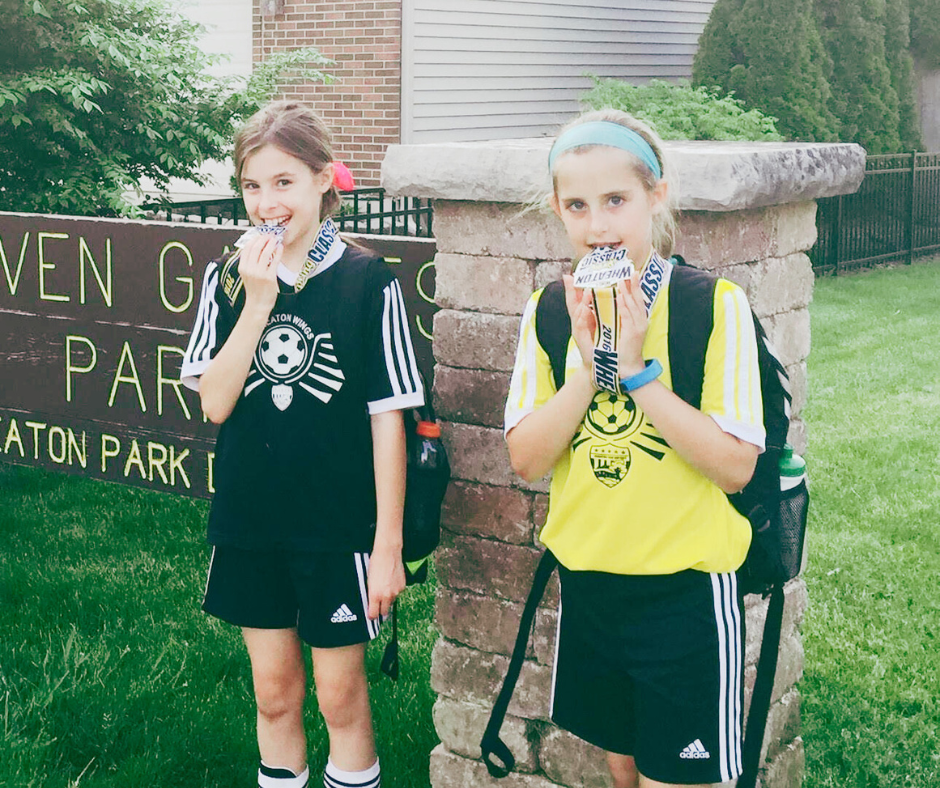
As youth sports parents, whose dream is it?
This is a contributed post from Whitney Fleming, author of You’re Not a Failure, My Teen Doesn’t Like Me Either, available October 15 wherever books are sold.
They could kick a ball before they could take their first step
As youth sports parents, whose dream is it? In my house, all three of my kids were in soccer gear by the age of four. They may have worn pink socks, pink cleats, and sparkly headbands, but they knew how to kick a ball before taking their first step.
My Daughter Quit Sport and This Is What I Want You To Know
It wasn’t surprising. My husband started playing in elementary school and didn’t stop until his body just couldn’t take it anymore. Soccer is one of the great joys of his life, so it was only natural that he wanted to pass that joy along to his kids.
Soccer tryouts impacted our sleep
It didn’t take long to see one of our daughters was way more interested in picking dandelions on the field than entering a toddler scrum to fight over a ball, so she retired early. We were all in with the other two, however. And while their experience with the sport was mostly positive, there were times I also knew that my husband and I didn’t have our heads on entirely straight.
Looking back on it now, it’s easy to see, but when we were in the thick of it? It was, and at times we were, the worst. Like, why were soccer tryouts so dramatic that sometimes it impacted our sleep?
Why were we so disappointed when one of our daughters had a bad game? Or why were the relationships with other parents often so awkward?
Everything is so competitive nowadays
While soccer dominated much of our time, I experienced this phenomenon in many other areas of my daughters’ lives. I’ve heard many parents discuss it as well, whether it was academics, music, student government, scholastic endeavors, or even Scouts. Everything is competitive nowadays.
For many, letting our older children walk away from something in which they (and us) have invested a significant amount of time (and most likely money) during their short lives often feels like such a difficult decision, even when your child has lost the joy and purpose of those same activities.
Our FOMO is ruining relationships with our teens
FOMO in parenting is real. It equates to a feeling of fear that your child may be left behind if they miss one session, one practice, one event. The premise that if you don’t declare your interest at an early age and invest in one thing then you can’t be successful is hurting our kids.
It’s causing today’s teens and tweens to burn out and get depressed. It’s causing them to stifle their interests and passions. It’s causing them to become bitter and resentful.
And it’s ruining our relationships with them.
We could see her struggling – she hadn’t enjoyed it for a few years
Our goal should be for our kids to learn life lessons from their extracurricular activities, such as leadership, teamwork, grit, and perseverance. We should want our kids to find healthy hobbies and pursuits that fill them up so that when they struggle in life, they have something to turn to that brings them joy. Kids should be able to try different activities to become well-rounded individuals instead of pawns to fill our personal voids and cash cows that fill someone else’s pockets.
And they should know that it’s okay for their dreams, their interests, and their passions to change. We must be willing to let go of any preconceived paths we want them to walk so they can discover what lights them up.
When one of my daughters decided to quit soccer during her freshman year of high school, it felt odd that it was such a big deal to so many people. She had kicked a black-and-white ball since she could walk, but she hadn’t enjoyed it for a few years.
We’ve always told her to dream big, have goals, and work hard. And she did that.
She and her dad always talked about having a shared experience of playing on a competitive high school team one day. She often traded sleepovers for early morning games and played in the freezing rain while her friends sat warmly in movie theaters or shopping malls—never once complaining.
But we could see her struggling. Her enthusiasm was draining both on and off the field, and we sensed that she was worried about disappointing us.
“It’s okay if you want to quit soccer”
In eighth grade, she decided on a whim to run cross country and track for her middle school while still playing club soccer. It was a lot on her and on us, but we could see her coming to life in her new sport.
My husband and I were the ones to bring it up to her. We said the words first: “It’s okay if you want to quit soccer.”
By that time in her young life, when we knew she was in a place that did not bring her joy, we didn’t see it the way she thought we did. While I brought it up to her several times, a conversation with her dad finally helped her drop the hammer. Her small face relaxed when her father said, “I’ll miss watching you on the pitch, but what I really want to see is you doing what you love.”
We told her it’s okay for dreams to change—hers and ours. Every step she took playing soccer led her somewhere else, maybe even someplace better. Her dad wanted the sport to bring her the same joy and positive experience that it brought him, but he recognized that she could get those life lessons through many different avenues.
And that she did.
We fell in love with a new sport
For her, quitting led to a spot on a D3 cross-country and track team for college, an opportunity she might not have had if she continued playing soccer. And, as a family, we fell in love with a new sport solely because she loved it first.
My youngest daughter still plays, and it is her favorite pastime. For a few years she was also a team member at a competitive club that often traveled out of state, and practices were up to 45 minutes away. Her team had a challenging year, and although she still loved the sport, we could tell she wasn’t enjoying it like she had in years past.
After many discussions, we asked her if she would like to return to our local town club so she could play with her friends, and it was closer to home. At first she wasn’t sure, but after thinking about it, she became more excited. We made the switch, and she never looked back.
After two seasons, the club owner approached my daughter to see if she would like to help coach a team of fourth-grade girls. Wanting to become an educator, my daughter leaped at the opportunity.
When you talk to her now, she would say that coaching is her passion. She spends her time mentoring younger players, teaching them tricks, and serving as a role model. It is her favorite part of her soccer experience, and while I believe she is an excellent coach and player, leading these young girls has boosted her confidence and self-esteem. As a parent, it is exactly what you want your child to get out of sports.
It takes courage for a parent to step back and recognize that what’s best for our kids may not be what we want for them
I don’t believe she would have had this opportunity if we stayed at her former club, where we spent more time and money than she was getting out of it. The most enriching experience for her did not come from pursuing the most competitive option; it came from choosing the best option for her health and well-being.
It takes courage for our kids to give up something they’ve poured their heart and soul into to pursue something different, just as it takes courage for any tween or teen to try something new.
But it also takes courage for a parent to step back and recognize that what’s best for our kids may not be what we want for them; it’s the dream they want to chase for themselves. We need to have faith that our child can figure it out no matter what the choices are.
Most of all, it takes an unrelenting belief that listening to what our tweens’ and teens’ needs are today provides the best opportunity for them to be surefooted tomorrow. Our big kids should never feel obliged to keep doing something for fear of disappointing those who are supposed to love them unconditionally, and we should not force them to do something because of our own fears, insecurities, or unfulfilled hopes and desires.
Our job as parents is always to be rooting for our kids.
Their performance should never be tied to our self-worth. Their achievements shouldn’t determine what we post on our social media feeds. Their dreams should never make them feel stuck, never be carried like a burden, never make them feel like prisoners, and never feel conditional to our love.
We don’t want our growing kids to give up on something because it’s hard, or they aren’t good at it, or because someone said it was silly or not worth doing.
Instead, we should encourage our kids to pursue their dreams with gusto, but it’s okay if they change direction, try something new, or take a break and rest.
It’s okay to give up on a dream because you’ve replaced it with a different one.
Our job as parents is always to be rooting for our kids. Our unconditional love can never waver, even when we don’t understand it. We want our kids to know they can go big but can always come home to dream again.

Check out our new podcast series:
Bring Back The Joy! Coach Ballgame Is Changing How We Coach Our Youth Athletes.
George Mumford: How Mindfulness Can Help Your Athlete
Tony Snethen: Good Enough: 45 Minutes that will change YOUR life.
Katie Wood: The Author of a Simple Seed. A book that will change your athlete’s life.











